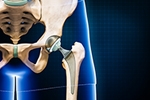Why Hip Pain Can Appear Months After Pregnancy-Even Without Injury
Hip pain after pregnancy is more common than many realize, especially in active women eager to return to exercise and daily routines. While discomfort is often blamed on muscle weakness or “normal” postpartum recovery, deeper changes within the body frequently play a role. Let’s explore how pregnancy-related hormonal and pelvic changes affect the hip joint.





